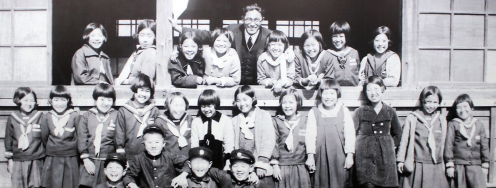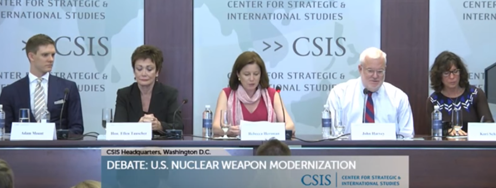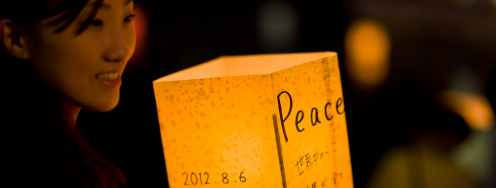Special Edition: President Obama Visits Hiroshima
On the radar: The President’s remarks; Senator Markey condemns nuclear spending; Confronting today’s arsenals; Human lessons from Hiroshima; Obama’s arms reductions have been minor; After the speech a need for action; Nukes don’t keep us safe; Looking ahead after Hiroshima; and Advice from a Hiroshima survivor
Obama’s speech in Hiroshima - “Seventy-one years ago, on a bright cloudless morning, death fell from the sky and the world was changed. A flash of light and a wall of fire destroyed a city and demonstrated that mankind possessed the means to destroy itself. Why do we come to this place, to Hiroshima? We come to ponder a terrible force unleashed in a not-so-distant past. We come to mourn the dead... Their souls speak to us. They ask us to look inward, to take stock of who we are and what we might become,” said President Obama in a speech at the Hiroshima Peace Memorial Park.
--“Science allows us to communicate across the seas and fly above the clouds, to cure disease and understand the cosmos, but those same discoveries can be turned into ever more efficient killing machines. The wars of the modern age teach us this truth. Hiroshima teaches this truth. Technological progress without an equivalent progress in human institutions can doom us. The scientific revolution that led to the splitting of an atom requires a moral revolution as well.”
--“We may not be able to eliminate man’s capacity to do evil, so nations and the alliances that we form must possess the means to defend ourselves. But among those nations like my own that hold nuclear stockpiles, we must have the courage to escape the logic of fear and pursue a world without them... That is a future we can choose, a future in which Hiroshima and Nagasaki are known not as the dawn of atomic warfare but as the start of our own moral awakening.” Full speech here transcribed by The New York Times. http://nyti.ms/1XW6H4O
Video - Watch the wreath laying ceremony here, via the White House YouTube channel. http://bit.ly/1ORILbu
See also - “Tears and Memories: A View From the Crowd,” by Motoko Rich for The New York Times. http://nyti.ms/1sSXe2O
Senator Markey urges nuclear sanity - “The devastation wrought on the Japanese city of Hiroshima seven decades ago will always be a powerful reminder of America’s responsibility to work toward a world free of nuclear weapons… We have made important progress in the past several years… But that progress came about as a result of a Faustian bargain. In exchange for Republican support for passage of New START in 2010, Obama promised to fund major upgrades to our nuclear arsenal. Since then, the extent of these upgrades and their cost has ballooned,” writes Senator Edward Markey for The Boston Globe.
--“If the United States wants other countries to reduce their nuclear arsenals and restrain their nuclear war plans, it must take the lead. It cannot preach nuclear temperance from a bar stool. Instead of wasting billions of dollars on dangerous new nuclear weapons that do nothing to keep our nation safe, Obama should scale back his nuclear weapons expansion plan. The United States already has the world’s most powerful military capabilities; it does not need any new nuclear weapons.” Read the full article here. http://bit.ly/1TEvAwu
Video- Watch Senator Markey’s remarks on the Senate Floor regarding his amendment to the National Defense Authorization Act and the need to curb nuclear spending. Video from C-SPAN. http://cs.pn/1RwM7jO
Time for nuclear cooperation - “Today, global nuclear arsenals are capable of destroying not only cities but also civilization itself… Since the end of World War II, the United States and our allies have relied on the ultimate threat of mutual assured destruction for our security… Today, with nine nations possessing nuclear arms and terrorists seeking them, this strategy has become increasingly hazardous and decreasingly effective,” writes Senator Sam Nunn for The Washington Post.
--“For more than 70 years, the United States and Russia have beaten the odds, avoiding a number of near-disasters. The recent deterioration in relations between the United States and Russia has greatly increased these risks… Obama’s visit to Hiroshima should remind the world that we are in a race between cooperation and catastrophe. The day after a nuclear weapon explodes, God forbid, what would we wish we had done to prevent it? Why don’t we do it now?” Full piece here. http://wapo.st/25pQDh6
Gaining perspective from destruction - “Over time, the debate about the meaning of Hiroshima has shifted from responsibility for the Cold War to the question of whether we should plan, indefinitely, to base our security on the threat of nuclear destruction… My childhood was marked by a genuine fear of nuclear war. And, at one point, hundreds of thousands of people turned out in Central Park to protest the arms race. It is hard to summon that sense of danger in a conference room on K Street. It’s much easier in a place like Hiroshima,” writes Jeffrey Lewis for Foreign Policy.
--“Making good-faith efforts to negotiate ‘general and complete disarmament under… international control,’ as we are obligated to do under Article VI of the Nuclear Non-Proliferation Treaty, might seem fanciful. But is disarmament as fanciful as the idea that the threat of nuclear holocaust will keep the peace forever?... Hiroshima might stand as a testament to the power of nuclear weapons, but it also testifies to the darkest possibilities in our institutions and in ourselves.” http://atfp.co/1sdZYHo
Stockpile reductions have been meager - “On Thursday, the Federation of American Scientists… issued an analysis of the new figures on its Strategic Security blog,” writes William Broad for The New York Times. “The new figures and private analysis underscored the striking gap between Mr. Obama’s soaring vision of a world without nuclear arms, which he laid out during the first months of his presidency, and the tough geopolitical and bureaucratic realities of actually getting rid of those weapons.”
--“The new figures show that in 2015 the Obama administration dismantled 109 warheads, the fewest of his presidency and down from a peak of 356 in 2009, his first year in office… On Thursday, the federation’s blog also updated a nuclear issue… first raised in 2014 — that Mr. Obama has reduced the size of the nation’s nuclear stockpile at a far slower rate than did any of his three immediate predecessors, including George Bush and George W. Bush.” Full article here. http://nyti.ms/1P3BGK7
See also - “Obama’s mixed record on fighting nuclear weapons,” by Christopher Woolf for PRI’s The World. http://bit.ly/1THdUFS
Still time for progress on Obama’s goals - “The President must use the visit as a starting point for taking concrete steps that will hasten the creation of a world free of nuclear weapons. He has eight months left to make a difference. Regardless of what one thinks about the decision to drop atomic bombs on Hiroshima and Nagasaki, we should all be able to agree that these awful weapons should never be used again,” writes William Hartung for Huffington Post.
--“President Obama could put the ill-conceived $1 trillion effort to build and operate a new generation of nuclear-armed bombers, submarines, and land-based missiles on hold… The ball is in the President’s court. Will he go beyond words to outline new agenda for nuclear disarmament? Or will he let this historic opportunity pass, to the detriment of our safety and the safety of our children and grandchildren?” Full story here. http://huff.to/1VlFIPq
Debunking the myth of deterrence - “The narrative that nuclear weapons are the ‘ultimate guarantors of security’ is powerful and comforting for many. The flip side, that only luck has prevented World War III, is almost too horrible to contemplate. Nuclear myths extend back to dawn of the atomic age. In 1945, very few people knew about America's secret project to build the atomic bomb. The Manhattan Project's purpose remained a mystery even to most of its hundreds of thousands of employees and members of Congress,” writes Erica Fein for U.S. News and World Report.
--“It is not surprising, therefore, that most Americans supported the bombings of Hiroshima and Nagasaki. War Secretary Henry Stimson quickly pronounced that this new weapon ended the war and saved 1 million American lives by averting an American invasion of Japan. Only later did details of the bombs' destructive effects come to light – some 200,000 instant deaths, flattened cities and enormous suffering. But by then, the war-winning significance of Hiroshima and Nagasaki had seeped into the American psyche.” Full piece here. http://bit.ly/1ORFsRo
Looking to the future - “The lesson of Hiroshima for my grandfather was to never forget what happened but to also refuse to become trapped in his feelings of loss, grief and anger. Instead, he looked toward the future and joined the ‘greatest generation’ of Japanese who emerged from the ashes of World War II to rebuild Japan. For the remainder of his life, this lesson of Hiroshima provided him with the resiliency to work toward making his vision of a thriving, modern Japan a reality,” writes Ray Matsumiya for USA Today.
--“At this time, it is crucial for groups of educators and community leaders ... to Hiroshima and draw their own lessons from the atomic bombing. Some of these efforts are already underway in this country, which is something I’ve personally advocated for. As I hope President Obama will experience, there is no substitute for hearing the first-hand testimonies of hibakusha nuclear survivors, witnessing the charred skeleton of the genbaku dome and feeling the sincere wishes of peace from the people of Hiroshima.” Full story here. http://usat.ly/1UanY4l
Advice from a survivor - When Hiroshima survivor Setsuko Thurlow heard that Obama might visit, she didn’t believe it. “I wasn't going to believe until last minute when he finally make the decision because I could anticipate all kinds of political problems he would have at home. That's why I thought he was very courageous. Finally, in spite of all odds he decided to go. So I appreciate that courage,” Thurlow said in an interview with Kelly McEvers for NPR.
--“But Mister Obama has committed one trillion dollars to modernize the nuclear weapons system — huge money. And once this happened, the Russians and Chinese would be right behind the United States. And there would be another nuclear arms race. We have waited 70 years. Enough is enough. We can't wait forever. We have to be getting on with the job of nuclear disarmament before anything happens by accident, by design or even by the terrorists. I just tremble with fear when I examine the reality.” Read the full story here. http://n.pr/1TNbCmL
Quick Hits:
--“Obama's Nuclear Paradox: Pushing For Cuts, Agreeing To Upgrades,” by Philip Ewing for NPR. http://n.pr/27UsHkK
--“Obama Visits Hiroshima With Disarmament Goals in Doubt,” by Angela Greiling Keane and Toluse Olorunnipa for Bloomberg. http://bloom.bg/25mluaU
--“This Original Manga Art Shows What It Was Like After U.S. Dropped Atomic Bomb On Hiroshima,” by Mamiko Nakano for Buzzfeed. http://bzfd.it/1TJ90VL
--“An overdue presidential visit to Hiroshima,” by Mark Fitzpatrick for the International Institute for Strategic Studies’ Politics and Strategy blog. http://bit.ly/1TCdP0S
--“Obama's Hiroshima visit strengthens his call for nuclear disarmament,” by Sharon Squassoni for the Guardian. http://bit.ly/25q4YdH
--“How Obama Will Redefine Hiroshima,” by Ted Widmer for Politico. http://politi.co/25oSvXD
--“Family shines light on American POW killed by Hiroshima blast,” by Margaret Brennan for CBS News. http://cbsn.ws/1TF4DOH
--“Peace Action Praises Obama’s Hiroshima Visit; Pushes for Action on Nuclear Abolition,” by Paul Kawika Martin for Peace Action. http://bit.ly/1VlFSq3
Events:
--“The Iran Nuclear Deal: Prelude to Proliferation in the Middle East?” with Yousef Al Otaiba, Ambassador of the United Arab Emirates, and Derek Chollet, German Marshall Fund. May 31 from 9:30 to 11:00 a.m. at the Brookings Institution,1775 Massachusetts Ave. NW, Washington. RSVP online. http://brook.gs/1RwPaZg
--“Global Nuclear Challenges and Solutions for the Next U.S. President,” with Benjamin Rhodes, deputy national security advisor to the President; Setsuko Thurlow, Hiroshima atomic bomb survivor; and seven other speakers. Presented by the Arms Control Association. June 6 from 9:00 a.m. to 2:30 p.m. at the Carnegie Endowment, Root Room, 1779 Massachusetts Ave. NW, Washington. RSVP online. http://bit.ly/23rIEK8
--“The Evolution of the Nuclear Order: A Global Perspective,” featuring Toby Dalton and five other speakers. June 6 from 3:00 to 5:00 p.m. at the Carnegie Endowment, 1779 Massachusetts Ave. NW, Washington. RSVP online. http://ceip.org/1Z2TzsO



